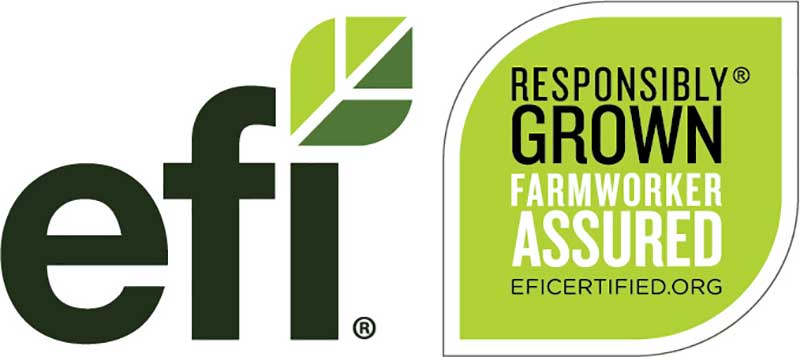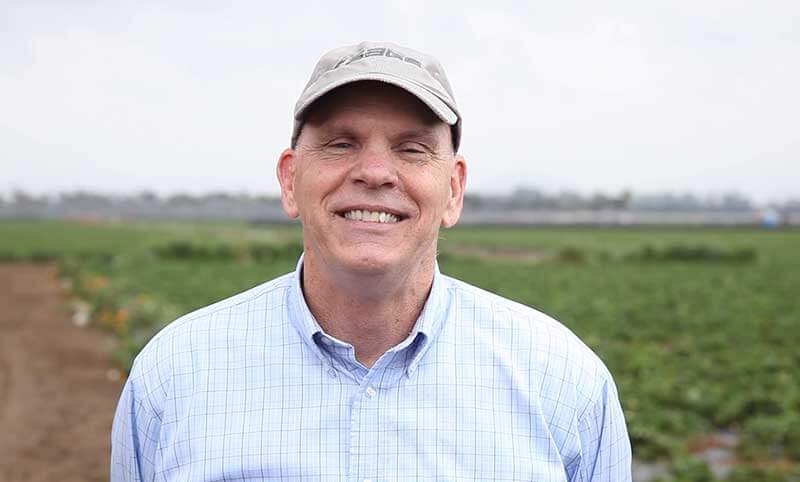In 2019, Equitable Food Initiative (EFI) received a $1.2 million grant from Walmart Foundation to advance responsible labor practices in Mexico, welcomed 15 new operations to its program, partnered with Costco Wholesale on a joint promotional campaign, updated its standards to align to the Ethical Charter on Responsible Labor Practices, continued progress toward Global Food Safety Initiative accreditation and unveiled a two-year study by BSD Consulting that quantifies effectiveness of its programs.
 “From engaging farmworkers who feel more valued to providing bonuses that help cover basic necessities, our success is measured by how we improve farmworkers’ lives,” said LeAnne Ruzzamenti, director of marketing communications for EFI. “And now 57 farming operations are applying the EFI program with active leadership teams who work to create safer and healthier conditions for 34,000 workers. As these numbers continue to grow, it’s important to reflect on the stories of the individuals and organizations who have been impacted.”
“From engaging farmworkers who feel more valued to providing bonuses that help cover basic necessities, our success is measured by how we improve farmworkers’ lives,” said LeAnne Ruzzamenti, director of marketing communications for EFI. “And now 57 farming operations are applying the EFI program with active leadership teams who work to create safer and healthier conditions for 34,000 workers. As these numbers continue to grow, it’s important to reflect on the stories of the individuals and organizations who have been impacted.”
Participating growers implemented a wide variety of initiatives in 2019 to improve working conditions, overcome language barriers, develop a more collaborative work environment and provide more access to education and skill building. As part of its workforce development programs, EFI forms leadership teams that communicate across all levels of the organization, and over time, the nonprofit says this creates a new culture, one that is focused on problem-solving and continuous improvement.
“EFI helps us engage our workforce at every level so that they understand and have input on the processes that make our food safer,” said Dan Borer, general sales manager at Keystone Fruit Marketing. “Our employees feel like they are part of the organization. If they see something in the field or in the packing house that they know isn’t right they have that freedom to come forward. It really makes a difference when you make this type of change. You are telling those workers that you are listening to them and giving them credit for the knowledge they have.”
The extra training and diligence expected from farmworkers on EFI-certified farms is rewarded with a bonus drawn from the sales of EFI produce to participating retailers. This year, more than $2 million will be distributed in bonuses, bringing the total to more than $8.5 million since the program’s inception. “The farmworkers report on the necessity of these bonuses to cover basic needs such as buying food, shoes and clothing; paying utility bills; and saving for Christmas gifts,” said Ruzzamenti. “Many of us might take these items for granted, but the EFI bonus program is helping meet farmworkers’ daily needs.”
In 2019, EFI-certified suppliers reported making a number of improvements as a result of the program. One supplier installed high-traffic carpet foam for added foot comfort in the area used to cut and prepare fresh produce. Another EFI team led initiatives to install a smog vacuum to improve air quality for employees working in its greenhouses and investigate why auto-driving carts were causing accidents.
A Baja California-based EFI leadership team focused on creating an inclusive work environment for all by embracing the indigenous languages spoken by more than 75 percent of farmworkers at that location. The team will develop learning materials on the EFI standards in both Ch’ol and Tzeltal so they are accessible to all employees. According to one team member, “The program has greatly helped those of us who speak a mother tongue. It was difficult before, some barely know how to speak Spanish and they do not understand it well. EFI has taught us that everything is possible.”
The EFI program creates a space on each farming operation where workers can bring their concerns and have them addressed. One greenhouse employee requested better lighting in parking lots to provide increased safety. Others brought forward the need for behavior guidelines on work-provided transportation to decrease interpersonal conflicts.
“We’re excited about EFI’s growth in 2019. It’s wonderful to know we are making a difference in helping our growers improve their bottom lines while improving the lives of farmworkers to create a safer and more transparent supply chain for both retailers and shoppers,” said Ruzzamenti.
Equitable Food Initiative is a nonprofit certification and skill-building organization that seeks to increase transparency in the food supply chain and improve the lives of farmworkers through a team-based approach to training and continuous improvement practices. EFI says it brings together growers, farmworkers, retailers and consumers to solve the most pressing issues facing the fresh produce industry.

